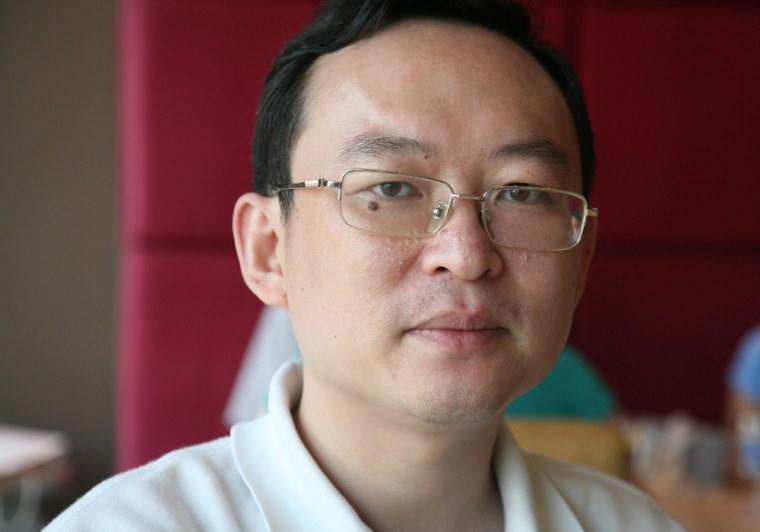Chinese dissident writer Yu Jie, who has been jailed and beaten, says harassment has forced him to move to the United States, possibly for good.
Yu told the South China Morning Post by email Thursday that he, his wife and son are staying with a church friend in Virginia.
Yu late Thursday told The Associated Press by telephone that he does not intend to return to China for at least a few years. He said he thinks Chinese authorities will not allow him back because he has accused them of torture and intends to write books on jailed Nobel Peace Prize winner Liu Xiaobo and Chinese President Hu Jintao.
He told the AP he was warned by Chinese authorities that if he wrote the books he could be jailed for publishing subversive material and tainting the image of China's Communist Party leaders.
Yu said he was detained several times in the last year and was beaten so badly that he passed out. He said he was also stopped from meeting friends and denied access to a computer.
"For a writer, being deprived of all freedom to communicate or express oneself is the worst thing that can happen, so I choose to live life in another way. Hopefully, here (in the U.S.) I can have a normal life and at least finish my work," he said.
Yu, who accused Premier Wen Jiabao of hypocrisy over democratic values in his book "China's Best Actor: Wen Jiabao," told the Post that he could not tolerate the increasing pressure from Beijing.
"My safety was seriously threatened," he said. Police had beaten him until he became unconscious when he was detained on Dec. 9, 2010, the eve of the Nobel Peace Prize ceremony honoring jailed dissident Liu.
Yu said he believed his book and his close ties with Liu were major factors in Beijing's action against him.
"But I have no regrets over writing that book. What has happened to me just proves that my judgment about Wen was correct."
Chinese Foreign Ministry spokesman Liu Weimin said Thursday he was unaware of Yu and reports of his departure. "I don't know this person and I don't know how many people regard him as a famous writer," he said.
The Global Times newspaper ran a commentary Friday with the headline "Self-imposed exile reflects one's waning influence." It said Yu's departure "contradicts the trend of diversifying public opinions growing here."
Yu helped found the Independent PEN Center in China, which fights for freedom of expression, and is a Christian who has angered authorities by outspokenly advocating religious freedom.
In July, another outspoken Chinese writer, Liao Yiwu, fled China for Germany after police repeatedly threatened him with imprisonment to prevent him from publishing any more of his controversial works overseas. Liao said after arriving in Berlin that he was happy to move to a place where he could "speak and publish freely."
On Thursday, activist Hu Jia said police questioned him for about seven hours, criticizing him for his frequent comments on Twitter about sensitive subjects including the denial of visitors to prominent rights lawyer Gao Zhisheng, who is serving a three-year jail sentence in China's remote Xinjiang region.
Hu said police were most concerned about a letter he wrote last month to the Nobel Peace Prize committee appealing for greater attention to the plight of Liu Xiaobo and his wife Liu Xia, who has been under house arrest for more than a year.
"It was a very official warning," Hu said, adding he was threatened with detention for up to 15 days.
